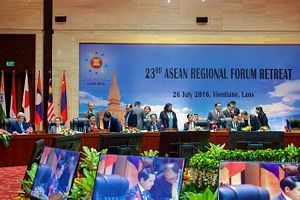On Wednesday, the Philippines publicly disclosed that North Korean a delegation led by Vice Foreign Minister Choe Hui-choi was recently in Manila ahead of the 24th ASEAN Regional Forum (ARF), which is set to kick off in early August. The meeting between Pyongyang and Manila, which is chairing ASEAN this year, marks the ongoing diplomatic efforts being waged by various actors amid the growing alarm about the North Korean issue.
As I have noted previously, North Korean engagement with Southeast Asian states, including the Philippines, is not new, even though various aspects of ties are often played up when crises occur (See: “The Myth of a North Korea-Malaysia Special Relationship”).
More specifically, the ARF, which the Philippines will be heading as this year’s ASEAN chair, has tended to serve as a rare opportunity where diplomatic developments on the North Korean issue can take place – or are speculated about – given that the forum is typically attended by Pyongyang as well as the other five members of the now suspended Six Party Talks – the United States, Japan, South Korea, China, and Russia. North Korea has been a participant at the ARF since 2000, and past developments have included sideline meetings by various actors as well as chance meetings or encounters.
But this year, the speculation on the nature of North Korean participation in the ARF has been particularly high. This reflects the growing alarm about the North Korean issue as well as the interesting dynamics that have been shaping up in the lead up to the ARF.
North Korea has shown no signs of ceasing its battery of missile and nuclear tests this year, with an intercontinental ballistic missile (ICBM) test launch on July 4 raising even more alarm about the threat Pyongyang poses. But beyond these individual moves, Pyongyang has also continued its diplomatic game as well, with its diplomats periodically meeting with Philippine officials to ask them not to put it under too much pressure at ASEAN engagements.
The United States, under President Donald Trump, has been ramping up the diplomatic and economic pressure on North Korea, including by telling Southeast Asian states to sever remaining links with Pyongyang (See: “North Korea-Myanmar Links in the Spotlight Under Trump”). Meanwhile, the new South Korean government under President Moon Jae-in has predictably shown a greater openness to diplomatic engagement with North Korea, despite the growing threat that Pyongyang poses as well as lingering doubts about the extent of its reciprocity to such outreach.
It is far from clear what exactly will happen at the ARF next month. The Philippine government was unsurprisingly vague about exactly what was discussed at the meeting with the North Korean delegation. And though Philippine Foreign Secretary Alan Peter Cayetano confirmed that North Korean Foreign Minister Ri Su-yong would be attending the ARF meeting, he also told reporters that despite other North Korean overtures, including an invite for him to go to Pyongyang after his recent trip to China, Manila would continue consulting with other ASEAN members and the other members of the Six Party Talks in what he termed a “concerted effort on the Korean Peninsula.”
Despite Cayetano’s rhetorical reassurance, all eyes will be on the language that the ARF eventually adopts in its statement following proceedings. Recent North Korean attempts to water them down have failed; notably, despite Pyongyang’s best efforts last year when Laos was chairing the ARF, the statement still ended up including strong language against it. Previous ASEAN statements on North Korea have also been tougher, relatively speaking. It reflects growing frustration among some Southeast Asian states with North Korea’s recent behavior.
South Korea, meanwhile, has not publicly denied the possibility of a meeting occurring between South Korean Foreign Minister Kang Kyung-wha, who plans to attend the ARF, and her North Korean counterpart. Apart from the other sideline meetings expected to take place between ARF participants as well as what Trump administration officials will say about regional security issues including North Korea, that will be something that observers will be tracking closely.
































